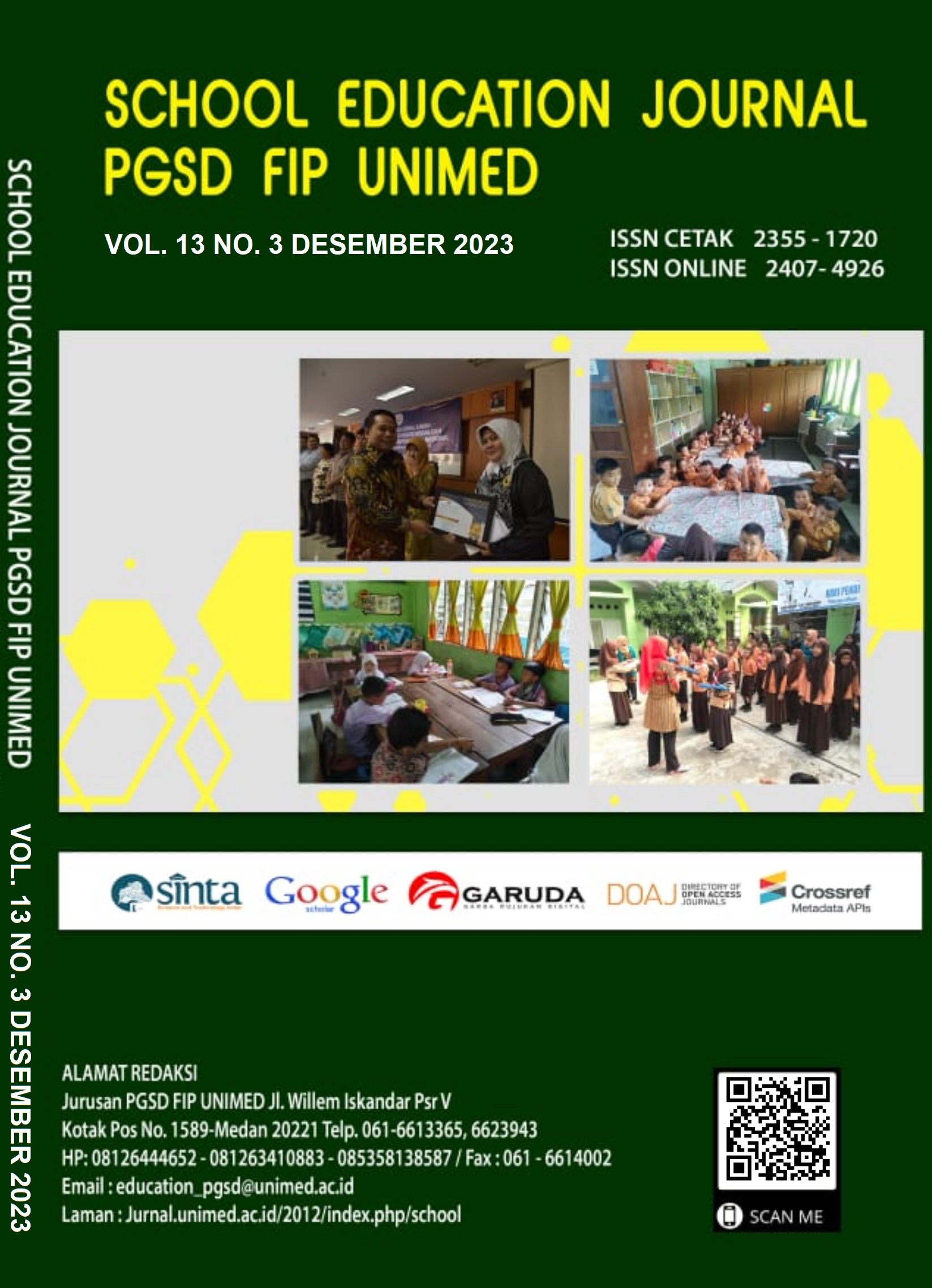KEPEMIMPINAN TRANSPERSONAL KEPALA SEKOLAH DI PENDIDIKAN DASAR
DOI:
https://doi.org/10.24114/sejpgsd.v13i3.54165Keywords:
Content, Formatting, Article.Abstract
The quality of education in elementary schools must be well maintained so that the next generation of a nation with character is formed. One of the factors that greatly influences the quality of education in elementary schools is good leadership. The principal as the main leader in elementary schools has a very important role in managing the school and leading all members of the school. In the last few decades, transformational leadership theory has become one of the most influential leadership models in education. The transformational approach to leadership has long been considered a productive approach. Transpersonal leadership offers a more humanistic and values-centered approach to addressing the complex challenges faced by today's organizations and societies).References
Alger, G. 2008. Transformational leadership practices of teacher leaders. Academic Leadership, 6(2). https://doi.org/10.58809/dgof3541
Barnett, K., Mccormick, J., & Conners, R. 2000. Leadership behaviour of secondary school principals, teacher outcomes and school culture. In Correspondence: K. Barnett. School of Education.
Berkovich, I. 2016. School leaders and transformational leadership theory: time to part ways?. Journal of Educational Administration, 54(5), 609“622. https://doi.org/10.1108/JEA-11-2015-0100
Chaudhry, J., Norulkamar Ungku Ahmad, U., Ahmad, J., Noureen, S., Jehanzaib Chaudhry, M., Norulkamar Bt Ungku Ahmad, U., & Binti
Ahmad, J. 2022. Transformational Leadership for Schools: A Review of Existing Literature International Journal of Advanced Multidisciplinary Research and Studies Transformational Leadership for Schools: A review of existing Literature. In Int. j. adv. multidisc. res. stud (Vol. 2, Issue 2). https://www.researchgate.net/publication/359330444
Day, C., Gu, Q., & Sammons, P. 2016. The Impact of Leadership on Student Outcomes: How Successful School Leaders Use Transformational and Instructional Strategies to Make a Difference. Educational Administration Quarterly, 52(2), 221“258. https://doi.org/10.1177/0013161X15616863
JOHN KNIGHTS. (n.d.). LeaderShape Corporate Guidelines How to Develop Ethical Leaders J O H N K N I G H T S. www.routledge.com
Kouni, Z., Koutsoukos, M., & Panta, D. 2018. Transformational Leadership and Job Satisfaction: The Case of Secondary Education Teachers in Greece. Journal of Education and Training Studies, 6(10), 158. https://doi.org/10.11114/jets.v6i10.3451
Leithwood, K., & Jantzi, D. 2000. The Effects Of Transformational Leadership On Organizational Conditions And Student Engagement With School. Journal of Educational Administration, 143.
Lin Tengi, M., Mansor, M., & Hashim, Z. 2017. A Review Theory of Transformational Leadership for School. International Journal of Academic Research in Business and Social Sciences, 7(3), 792. https://doi.org/10.6007/IJARBSS/v7-i3/2847
Moradi Korejan, M., & Shahbazi, H. 2016. An analysis of the transformational leadership theory. Journal of Fundamental and Applied Sciences, 8(3), 452. https://doi.org/10.4314/jfas.v8i3s.192
Ngang, T. K. 2011. The effect of transformational leadership on school culture in male™ primary schools Maldives. Procedia-Social and Behavioral Sciences, 30, 2575“2580. https://doi.org/10.1016/j.sbspro.2011.10.503
Quin, J., Deris, A., Bischoff, G., & Johnson, J. 2015. Comparison of Transformational Leadership Practices: Implications for School Districts and Principal Preparation. Journal of Leadership Education, 14(3). https://doi.org/10.12806/v14/i3/r5
Downloads
Published
Issue
Section
License
Authors whose manuscripts are approved are approved as follows:
The publication rights for all journal manuscript materials published/published on the SEJ (School Education Journal) E-Journal site are held by the editorial board with the author's knowledge (moral rights remain with the manuscript authors).
The formal legal requirements for accessing this electronic digital journal article are subject to the terms of the Creative Commons Attribution-ShareAlike (CC BY) license, which means that E-Journal SEJ (School Education Journal) has the right to store, transfer media/format, manage in the form of a database, maintain, and publish articles without asking permission from the author as long as the author's name remains as the copyright owner.
Manuscripts published/published electronically are open access for educational, research, and library purposes.

